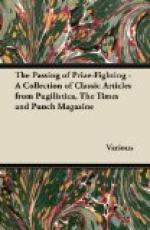FROM very early days, the days, or nights, of The Battle of Waterloo and Scenes in the Circle, with the once-renowned WIDDICOMB as Master of the Ring, Mr. Punch has ever been particularly fond of the old-fashioned equestrian entertainment. The Ring to which he has just made allusion is, it need hardly be added, The Circus, and The Book is a novel by Miss AMYE READE. Mr. P. is not sweet upon any gymnastic and acrobatic shows in which the chances of danger appear, and probably are, as ten to one against the performer; and especially does he object to children of very tender years being utilised in order to earn money for their parents or guardians by exhibiting their precocious agility. Mr. P. approves of the ancient use of the birch as practised at Eton a quarter of a century ago, and he is quite of the Wise Man’s opinion as to the evil consequences of sparing the rod; which proverbial teaching, had it been practically and judiciously applied to Master SOLOMON himself (the ancient King, not the modern Composer) in his earliest years, would probably have prevented his going so utterly to the bad in the latter part of his life. So much, as far as corporal punishment is concerned, for the education of youth, whether in or out of the circus school. But girls, as well as boys, are trained for this circus business, gaining their livelihood by acrobatic performances. Does Mr. Punch, representing the public generally, quite approve of this portion of circus and acrobatic training? To this he can return only a qualified answer. His approval would depend, first, on the natural but extraordinary capability of the female pupil, and, secondly, the method of training her. As a rule, he would prefer to keep her out of it altogether: and, as to the boys, he certainly would defer their public appearance until they were at least sixteen; their previous training having been under the supervision of a responsible inspector. Then as to the training of animals for the circus business. If the training system means “all done by kindness,” that is, by unflinching firmness and a just application of a considerately devised system of equally balanced rewards and punishments, then Mr. P. approves; but where cruelty comes in, whether in the training of child or beast, Mr. Punch would have such trainer of youth punished as Nicholas Nickleby punished Squeers, in addition to imprisonment and fine; and for cruelty to dumb animals Mr. P. would order the garotter’s punishment and plenty of it. Having professed this faith, Mr. Punch, after thus “arguing in a Circle,” returns to his starting-point, and would like to know how much of truth there is in Miss AYME READE’S story entitled, Slaves of the Sawdust? As literature it is poor stuff, but as written with a purpose, and that purpose the exposing of alleged systematic cruelty in training children and dumb animals for the circus-equestrian acrobatic life, the book should not only attract general notice, but should also lead to a Commission of inquiry, or to some united action of all responsible circus-managers against the author of this work, which would result in either the said managers or the authoress being “brought to book.” Mr. Punch hath spoken. Verb. sap.




